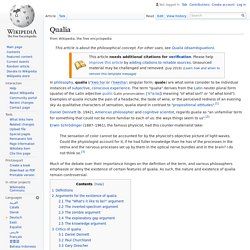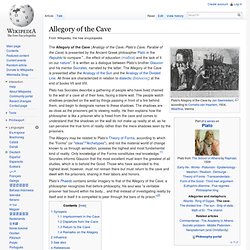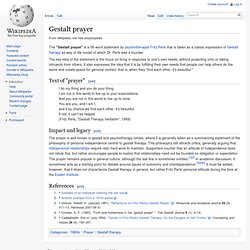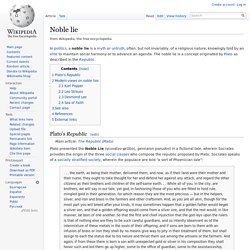

Qualia. In philosophy, qualia (/ˈkwɑːliə/ or /ˈkweɪliə/; singular form: quale) are what some consider to be individual instances of subjective, conscious experience.

The term "qualia" derives from the Latin neuter plural form (qualia) of the Latin adjective quālis (Latin pronunciation: [ˈkʷaːlɪs]) meaning "of what sort" or "of what kind"). Examples of qualia include the pain of a headache, the taste of wine, or the perceived redness of an evening sky. As qualitative characters of sensation, qualia stand in contrast to "propositional attitudes".[1] Daniel Dennett (b. 1942), American philosopher and cognitive scientist, regards qualia as "an unfamiliar term for something that could not be more familiar to each of us: the ways things seem to us".[2] Erwin Schrödinger (1887–1961), the famous physicist, had this counter-materialist take: Allegory of the Cave. Plato has Socrates describe a gathering of people who have lived chained to the wall of a cave all of their lives, facing a blank wall.

The people watch shadows projected on the wall by things passing in front of a fire behind them, and begin to designate names to these shadows. The shadows are as close as the prisoners get to viewing reality. He then explains how the philosopher is like a prisoner who is freed from the cave and comes to understand that the shadows on the wall do not make up reality at all, as he can perceive the true form of reality rather than the mere shadows seen by the prisoners. The Allegory may be related to Plato's Theory of Forms, according to which the "Forms" (or "Ideas"/"Archetypes"), and not the material world of change known to us through sensation, possess the highest and most fundamental kind of reality. Synopsis[edit] Plato's beard. Plato's beard refers to a paradoxical argument dubbed by Willard Van Orman Quine in his 1948 paper On What There Is in which he stated that: This is the old Platonic riddle of nonbeing.

Nonbeing must in some sense be, otherwise what is it that there is not? This tangled doctrine might be nicknamed Plato's beard; historically it has proved tough, frequently dulling the edge of Occam's razor.[1] The Indian philosophical system Vaisheshika has a distinct category called 'Abhava' (non-existence). It deals with this concept in detail, classifying it into absolute, anterior, posterior and reciprocal non-existence. Further reading[edit] Durrant, Michael (1998). References[edit] 167571. I heard this saying years ago, and the explanation I got was somewhat different -- possibly because the person telling it to me was from a more warlike tradition.

Yes, there are more warlike Buddhist traditions ::ducks for flames:: The explanation I heard was that if you see the Buddha on the road, it is the path you should take, and by killing him you become him. The explanation below from the Daily Dharma is related, but different. But since we're all one, I guess it doesn't really matter. -----------------------------------------------If You See The Buddha, Kill HimFor 300 years after Buddha's death there were no Buddha images. Gestalt prayer. The "Gestalt prayer" is a 56-word statement by psychotherapist Fritz Perls that is taken as a classic expression of Gestalt therapy as way of life model of which Dr.

Perls was a founder. The key idea of the statement is the focus on living in response to one's own needs, without projecting onto or taking introjects from others. It also expresses the idea that it is by fulfilling their own needs that people can help others do the same and create space for genuine contact; that is, when they "find each other, it's beautiful. " Text of "prayer"[edit] I do my thing and you do your thing. Impact and legacy[edit] The prayer is well known in gestalt and psychotherapy circles, where it is generally taken as a summarizing statement of the philosophy of personal independence central to gestalt therapy. References[edit] Noble lie. Plato's Republic[edit] Plato presented the Noble Lie (γενναῖον ψεῦδος, gennaion pseudos) in a fictional tale, wherein Socrates provides the origin of the three social classes who compose the republic proposed by Plato; Socrates speaks of a socially stratified society, wherein the populace are told "a sort of Phoenician tale": . . . the earth, as being their mother, delivered them, and now, as if their land were their mother and their nurse, they ought to take thought for her and defend her against any attack, and regard the other citizens as their brothers and children of the self-same earth. . .

While all of you, in the city, are brothers, we will say in our tale, yet god, in fashioning those of you who are fitted to hold rule, mingled gold in their generation, for which reason they are the most precious — but in the helpers, silver, and iron and brass in the farmers and other craftsmen. Socrates proposes and claims that if the people believed "this myth . . . Karl Popper[edit]